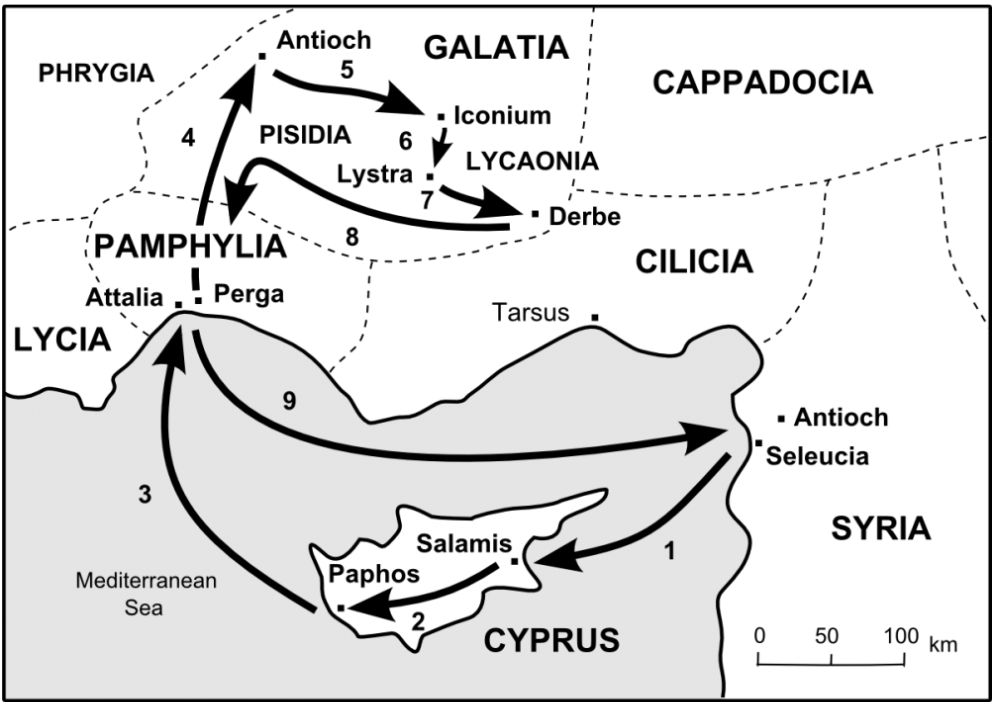Acts 14 | Facing HardshipSample


Facing Misunderstanding
Paul and Barnabas flee Iconium and come to Lystra. In the next few chapters, Acts is going to throw a lot of geography at us. A map speaks 1000 words, and it’s worth taking a moment to look at one to get a sense of what’s happening. Here’s one to help give you a sense of Paul’s overall travel picture from Acts 12-14. (You can easily find all kinds of Paul travel maps online or, as you see in this plan, from a commentary like NT Wright’s Acts for Everyone.)
Lystra was a Roman colony. According to the commentator William Barclay, they had a legend that Zeus and Hermes had once disguised themselves in human form and visited near Lystra. No one would show them hospitality except two old peasants. As a result, the whole population was wiped out by the gods, but these two peasants were honored and made temple guardians to the gods instead.
Imagine this story embedded in the psyche of Lystra. These people were not about to make the same mistake again.
Into this come Paul and Barnabas. They meet a man born lame, who listens to them speaking. On seeing his openness to the gospel, they heal him. And the crowd goes wild.
They call Barnabas “Zeus,” and Paul, “Hermes.” They adorn them as gods and are even about to sacrifice to them, at which point Luke tells us Paul and Barnabas tore their clothes and rushed into the crowd, shouting, “Friends, why are you doing this? We too are only human, like you. We are bringing you good news, telling you to turn from these worthless things to the living God…” (Acts 14:15).
Expect to face misunderstanding when you follow Jesus.
People will not understand what you believe, or why you believe it. People will confuse what you’re saying and distort it. People will try to fit God’s good news into their already pre-formed package. As Jesus puts it, trying to pour his new wine into their old wineskins. The result is often confusion, or rejection, as you try to guide them through.
Paul and Barnabas didn’t witness the same way they did in the synagogues. These people are not Jews and they do not share the same story. Instead, they take it back to the shared story of humanity, which is creation, and the world we continue to share. “Turn from these worthless things to the living God, who made the heavens and the earth and the sea and everything in them,” they say. “In the past, he let all nations go their own way. Yet he has not left himself without testimony: He has shown kindness by giving you rain from heaven and crops in their seasons; he provides you with plenty of food and fills your hearts with joy” (Acts 14:16-17). But Luke tells us that even with these words, they had difficulty keeping the crowd from sacrificing to them.
As a follower of Jesus, you’ll often face a rough road in helping people come to see. People will deify you and villainize you. People will misunderstand your intentions. It is often a long and patient road helping people come to know Jesus. And it can be frustrating when people just can’t seem to grasp it.
There’s a life lesson to be learned from Paul and Barnabas in Acts 14. Speak to people where they’re at. Find the common story and breathe Jesus into that. Address the misconceptions. Speak good news. And point them to Jesus, every step of the way. Will there still be misunderstandings? Maybe. Do what you can and trust the rest to God.
About this Plan

Follow Jesus and you’ll face hardship. It was true of the early disciples. It will be true for you. This 5-day plan uses Acts 14 as a guide for living for Christ when hardship comes. It continues a journey through the book of Acts, the Bible’s gripping sequel of Jesus at work in the life of his followers as he expands his kingdom to the ends of the earth. It’s a journey on what it means to be a Christian. It’s a story in which you have a role to play.
More
We would like to thank Fellowship of Faith for providing this plan. For more information, please visit: https://fellowshipoffaith.org
Related Plans

A 5-Day Journey Exploring Moses’ Burning Questions

What You Earn Isn't Who You Are

Shepherds at Christmas

The Strength Approach to Christian Wellness

7 Keys for Spiritual Warfare

Christmas: The Things We May Have Missed

Advent: The Light That Rises in the Darkness

Beyond the Stable: Christ's Mission on Earth

And He Shall Be Called: Advent Devotionals, Week 3
